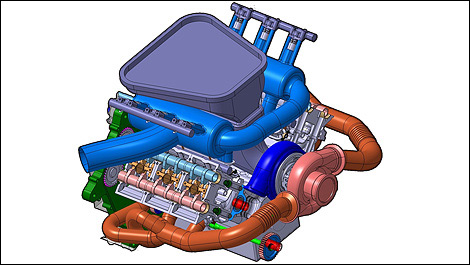Jun
19th
Stay connected Subscribe to our RSS feed
Martin Whitmarsh, director of the McLaren Formula 1 team told British magazine Autosport that Grand Prix racing had not choice but to move to greener engines.
Whitmarsh explained that the move to more environmentally friendly, smaller turbo engines from 2014 is a crucial step forward for F1.
Engine suppliers are currently developping and even test benching their new 1.6-litre turbo engines, and the introduction of a new engine formula will translate into higher costs for the teams.
Some say that the annual costs for power trains (engines. KERS and transmissions) will jump to an estimated 20 million euros per year.
Talking to Autosport, Whitmarsh said "If you introduce rule changes - all for good reasons to make the sport socially relevant and to make the technologies appropriate, there will inevitably be a cost of so doing. And that is something we have to be balanced about and very cautious about”.
The McLaren boss thinks that if F1 stuck long-term to the current V8 normally aspirated engines then it could leave itself open to criticisms about not having environmental concerns.
"If F1 is perceived as a gas-guzzling sport that has no regard to the technologies that are very relevant to automotive companies, then we really promote the wrong image. F1 should be about efficiency,” Whitmarsh added.
"People are talking about the efficient use of resources. No sport should be at liberty to spend almost unlimited amounts of money and resource with no focus on efficiency,” he ended.
Whitmarsh explained that the move to more environmentally friendly, smaller turbo engines from 2014 is a crucial step forward for F1.
Engine suppliers are currently developping and even test benching their new 1.6-litre turbo engines, and the introduction of a new engine formula will translate into higher costs for the teams.
 |
| Illustration of the PURE V6 turbo engine. (Image: PURE) |
Some say that the annual costs for power trains (engines. KERS and transmissions) will jump to an estimated 20 million euros per year.
Talking to Autosport, Whitmarsh said "If you introduce rule changes - all for good reasons to make the sport socially relevant and to make the technologies appropriate, there will inevitably be a cost of so doing. And that is something we have to be balanced about and very cautious about”.
The McLaren boss thinks that if F1 stuck long-term to the current V8 normally aspirated engines then it could leave itself open to criticisms about not having environmental concerns.
"If F1 is perceived as a gas-guzzling sport that has no regard to the technologies that are very relevant to automotive companies, then we really promote the wrong image. F1 should be about efficiency,” Whitmarsh added.
"People are talking about the efficient use of resources. No sport should be at liberty to spend almost unlimited amounts of money and resource with no focus on efficiency,” he ended.
 The latest auto news, reviews, prices, product and vehicle releases.
The latest auto news, reviews, prices, product and vehicle releases.